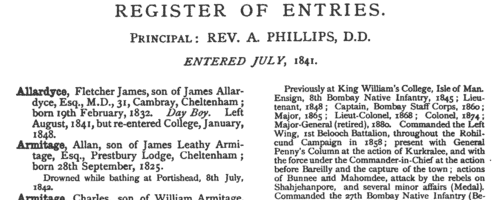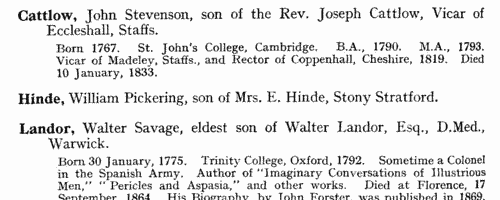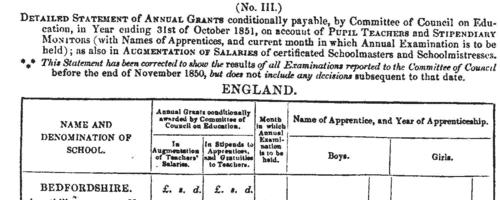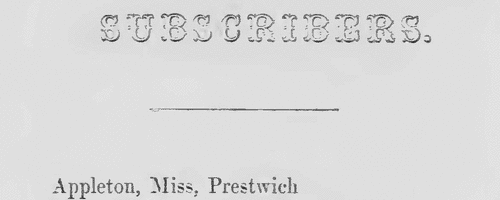Woodyatt Surname Ancestry ResultsOur indexes 1000-1999 include entries for the spelling 'woodyatt'. In the period you have requested, we have the following 74 records (displaying 21 to 30): Single Surname Subscription | | | Buying all 74 results of this search individually would cost £392.00. But you can have free access to all 74 records for a year, to view, to save and print, for £100. Save £292.00. More... |
These sample scans are from the original record. You will get scans of the full pages or articles where the surname you searched for has been found. Your web browser may prevent the sample windows from opening; in this case please change your browser settings to allow pop-up windows from this site.  Persons of standing recommending London police recruits
(1830-1842) Persons of standing recommending London police recruits
(1830-1842)
The Metropolitan Police Register of Joiners (MEPO 333/4) lists policemen joining the force through to 31 December 1842 (to warrant number 19892). The register is alphabetical, in so far as the recruits are listed chronologically grouped under first letter of surname. It is evidently a continuation of a similar earlier register, not closed until its alphabetical sections were filled: consequently, there are no entries in this register for the initial letters N, O, Q, U, V, X, Y or Z; and the sections of this register start at different dates - A 18 April 1840 (warrant number 16894); B 11 December 1830 (5570); C 7 September 1830 (4988); D 27 May 1833 (8445); E 15 December 1838 (14476); F 30 March 1832 (7372); G 1 December 1835 (11,184); H 25 April 1832 (7457); I and J 13 February 1837 (12449); K 2 January 1838 (13457); L 3 October 1834 (9905); M 15 November 1832 (7999); P 4 October 1831 (6869); R 4 September 1837 (13021); S 30 March 1835 (10366); T 6 April 1840 (16829); W 30 December 1833 (9096). The register gives Date of Appointment, Name, Number of Warrant, Cause of Removal from Force (resigned, dismissed, promoted or died), and Date of Removal. Those recruits not formerly in the police, the army, or some government department, were required to provide (normally) at least two letters of recommendation from persons of standing, and details of these are entered on the facing pages: the names in these are indexed here (the police recruits are indexed separately and not included here). Recruits transferred from other forces or rejoining the force did not normally need recommendations - in the latter case, former warrant numbers are given - but some recommendations are from police inspectors, even other constables. Recruits coming from the army sometimes have general military certificates of good conduct, but most often have a letter from their former commanding officer; recruits recommended by government departments (most often the Home Office) similarly have letters from the head of department. But the great majority of the names and addresses in these pages are of respectable citizens having some sort of personal acquaintance with the recruit. Where more than two recommendations were provided, the clerk would only record one or two, with the words 'and others'. Tradesmen are sometimes identified as such by their occupations; there are some gentry. Although the great bulk of these names are from London and the home counties, a scattering are from further afield throughout Britain and Ireland. WOODYATT. Cost: £8.00.  | Sample scan, click to enlarge

| Boys entering Cheltenham College
(1842)
Cheltenham College 'was founded in order to provide for the sons of gentlemen a Classical, Mathematical, and General Education of the highest order, on moderate terms, in strict conformity with the principles and doctrines of the Church of England.'
Andrew Alexander Hunter, the college registrar, compiled the first edition of the College Register in four parts from 1883 to 1886: these merely listed the boys by term of entry, with their dates of birth and names and addresses of their fathers. Circulars were also sent out to all Old Cheltonians whose addresses were known, requesting additional details. On the basis of the returns from these and Hunter's further researches, this much fuller register was published in 1890.
The information after each boy's name is given (where known and applicable) in this format: father's full name and address as of the time the boy entered the college; class and department on entering the college (classes being number from 1 downwards, and these again divided into A and B, some into C and D, others into P (Principal's side) and V. P. (Vice-Principal's side) - 1A was the highest class in each department: besides this, certain others were called Addiscombe, Woolwich, Civil, Direct, Line, Sandhurst, Naval, Special, Preparatory, Latin, and India Civil) and the same on leaving, name of Boarding House (or 'Day Boy'), scholastic and athletic honours attained at the college, and subsequent career (including date and place of death, or present address in 1890, if known).WOODYATT. Cost: £4.00.  | Sample scan, click to enlarge

| Boys entering Rugby School
(1842)
This edition of Rugby School Register was published in 1933: the volume covering 1675 to 1857 contains 6480 entries, based on the original school admission registers, but elaborated with general biographical information wherever the editor was able to do so. The entries for the 17th and early 18th centuries are much less detailed than those for later years. The arrangement of the fullest entries was to give the boy's full name (surname first, in bold); whether eldest, second, &c., son; father's name and address as of when the boy entered school; the boy's age at entry and birthday; name of the house (in the school) to which he belonged; then a brief general biography; and date and place of death. WOODYATT. Cost: £4.00.  | Sample scan, click to enlarge

| Insolvents
(1843)
Insolvency notices for England and Wales: insolvency often caused people to restart their lives elsewhere, so these are an important source for lost linksWOODYATT. Cost: £6.00.  | Sample scan, click to enlarge

| Insolvents in Bankruptcy
(1844)
Insolvency in bankruptcy notices for England and Wales: insolvency often caused people to restart their lives elsewhere, so these are an important source for lost linksWOODYATT. Cost: £6.00.  | Sample scan, click to enlarge

| Bankrupts
(1848)
Bankruptcy notices for England and Wales: bankruptcy often caused people to restart their lives elsewhere, so these are an important source for lost links
WOODYATT. Cost: £6.00.  | Sample scan, click to enlarge

| Inhabitants of Sherbourne in Warwickshire
(1850)
Francis White & Co.'s History, Gazetteer, and Directory of Warwickshire for 1850 lists nobility, gentry, clergy, other private residents, farmers and traders, hundred by hundred and village by village, with separate sections for the large towns.WOODYATT. Cost: £6.00.  | Sample scan, click to enlarge

| Inhabitants of Warwick
(1850)
Francis White & Co.'s History, Gazetteer, and Directory of Warwickshire for 1850 lists nobility, gentry, clergy, other private residents, farmers and traders, hundred by hundred and village by village, with separate sections for the large towns.WOODYATT. Cost: £6.00.  | Sample scan, click to enlarge

| Pupil Teachers in Worcestershire: Boys
(1851)
The Committee of Council on Education awarded annual grants for the training and support of pupil teachers and stipendiary monitors in schools in England, Wales, Scotland, the Isle of Man and the Channel Islands. Pupil teachers started training between the ages of 13 and 15, and 'must not be subject to any bodily infirmity likely to impair their usefulness as Pupil Teachers, such as scrofula, fits, asthma, deafness, great imperfections in the sight or voice, the loss of an eye from constitutional disease, or the loss of an arm or leg, or the permanent disability of either arm or leg, curvature of the spine, or a hereditary tendency to insanity'.
They also had to obtain certificates from the managers of the school (and their clergyman, in the case of Church of England schools) as to their moral character and that of their family; good conduct; punctuality, diligence, obedience, and attention to duty; and attentiveness to their religious duties.
This detailed statement in the annual report of the committee for the year ending 31 October 1851 lists schools by county, giving:
1. Name and Denomination of School, with these abbreviations - B, British and Foreign School Society; F. C., Free Church of Scotland; H. C., Home and Colonial School Society; N., National Society, or connected with the Church of England; R. C., Roman Catholic Poor-School Committee; Wesn., Wesleyan Methodist.
2. Annual grants conditionally awarded by the committee in augmentation of teachers' salaries, and in stipends to apprentices, and gratuities to teachers.
3. Month in which annual examination was to be held.
4. Names of apprentices, giving surname and initials, and year of apprenticeship. Stipendiary monitors are indicated by (S. M.).WOODYATT. Cost: £6.00.  | Sample scan, click to enlarge

| Subscribers to 'Poems for Home'
(1851)
'Poems for Home', by Isabella Caulton (authoress of the 'Domestic Hearth,' and other poems) was published at Leamington Spa in 1851.WOODYATT. Cost: £4.00.  | Sample scan, click to enlarge

|
Research your ancestry, family history, genealogy and one-name study by direct access to original records and archives indexed by surname.
|













